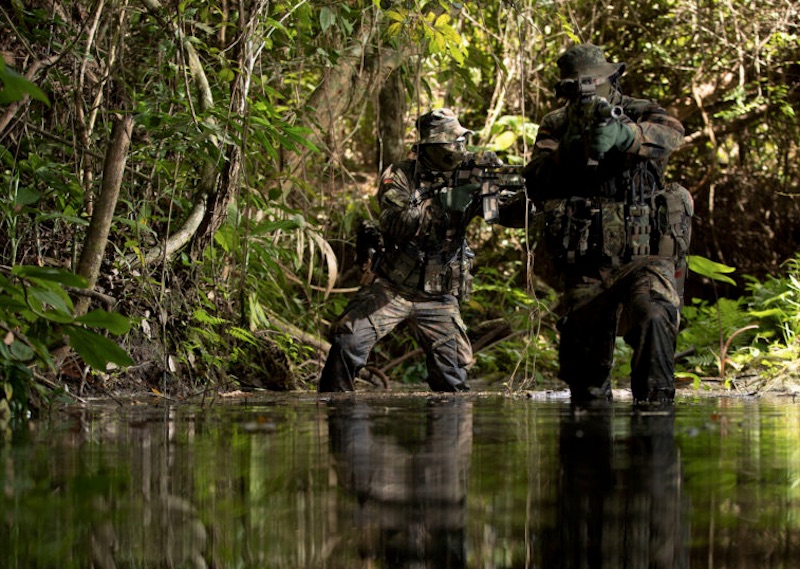Get the weekly SPARTANAT newsletter.
Your bonus: the free E-Book from SPARTANAT.

In crises, as we are currently experiencing them, there is not always time for in-depth analysis and discussions. Crises are characterized by high dynamics and the necessity to make quick decisions. Since these decisions often have far-reaching consequences, it is important to come to valid insights and decisions under stress and time pressure.
Derived from the conversations for the book "Leading on the Edge: What Managers Can Learn from Boundary Situations for Everyday Business" with the interview partners from the Bundeswehr, GSG 9, with pilots, emergency physicians, and managers, the most important 5 maxims for reliable action have been compiled here by Wiebke Köhler ImpactWunder Strategy Consulting. They offer a good starting point to master the crisis. These maxims are used by commando soldiers all over the world. They are the basis for every successful mission and should also guide us in civilian crises.
MAXIM 1: COVER
Cover in the everyday life of a soldier translated into the everyday life of management means: solidarity. The team stands up for each other, covers each other. This means that each individual in a team stands up for the others, supports each other to fulfill a mission. Everyone has to look beyond their own responsibilities and work together to achieve the best possible result. Because if one fails in the team, everyone fails. And if the team wins, every individual wins and contributes to the success. Therefore, after the crisis, incentive and bonus systems should be set up to reward this behavior accordingly.
MAXIM 2: KEEP MOVING
When bullets fly in combat, the commando soldier knows only one thing: to move, not to present an easy target. This principle also applies in management: do not sink into paralysis out of fear, do not fall into blind activism. Instead, sort the options calmly and thoughtfully, weigh the pros and cons briefly, and make a decision. Because even a non-decision has a price in such situations!
MAXIM 3: PRIORITIZE
In the complex world, especially in crises or extreme leadership situations, a multitude of data, decisions, and activities rush towards the leader. It is important to keep a cool head and set clear priorities for the team - and execute them consistently. If you are too caught up in the hustle and bustle, it is advisable to achieve some distance with the famous bird's eye view. With a clear head, the leader should then determine the highest priority where it is most important for achieving the goal - and communicate this to the team accordingly.

Interested in more special forces and their leadership style? The series "KSK - Never Fight Alone" is streaming on YouTube. Here's the link: https://www.youtube.com/playlist?list=PL0nyHde37tIb4uJTpTTDZ6QEumRgqJxMR
MAXIM 4: SIMPLICITY
Too complex and complicated instructions lead to confusion and misunderstandings, to follow-up questions, to misinterpretations, at the very least to time loss in understanding the task. The leader must make it clear to everyone in the team what the overarching intent behind the mission is, the underlying goal. Orders for goal achievement should be as simple, understandable, and concrete as possible. Simple language should also be used so that everyone understands the "direction."
MAXIM 5: SHARING RESPONSIBILITY
With the variety of topics to be dealt with on a daily basis, the leader cannot keep everything in view. Therefore, it is important that leadership and decision-making authority be decentralized, depending on the level. Each person should take on a leadership task and responsibility in their area and position. For this, employees must understand what they should do concretely and why. The leader should communicate this frequently and clearly. The employee must also be able to rely on knowing what the supervisor actually aims to achieve with his assignment and within what limits he may make decisions. This is also about the mutual trust between employee and leader!
And finally, Ed Stafford, an extreme adventurer and survival expert, recommends: "In hopeless situations, real crises, it's not about being particularly brave. It's about staying positive and motivated." It is about managing stress to the point where you remain able to act, weigh options, and make decisions. This is what we have learned from the Bundeswehr, the GSG 9, the pilots, and the emergency physicians. Stafford continues: "It is important to know that the plans you made beforehand are constantly changing. This is normal and part of everyday life, especially in crises. It is important to know this. You must not give up and must constantly realign and adapt. That's how you survive!"
In this spirit, I wish you to always be well-equipped for your leadership task, because: the next crisis will surely come!
HERE is the link to YouTube and the series: "KSK - Never Fight Alone"
WIEBKE KÖHLER worked during her professional career at the top management consultancies Roland Berger and McKinsey & Co. As a partner in executive search, she accompanied international, global corporations in filling executive positions and most recently held the position of Chief Human Resources Officer at AXA Konzern AG in Germany. She is the founder and CEO of the top management consultancy ImpactWunder, supporting corporations and medium-sized companies in culture and power change and in leadership development. Here is the link to the book "Leading on the Edge: What Managers Can Learn from Boundary Situations for Everyday Business".
ImpactWunder website: www.impactwunder.com
SPARTANAT is the online magazine for Military News, Tactical Life, Gear & Reviews.
Send us your news: [email protected]
Ad
similar
Get the weekly SPARTANAT newsletter.
Your bonus: the free E-Book from SPARTANAT.



